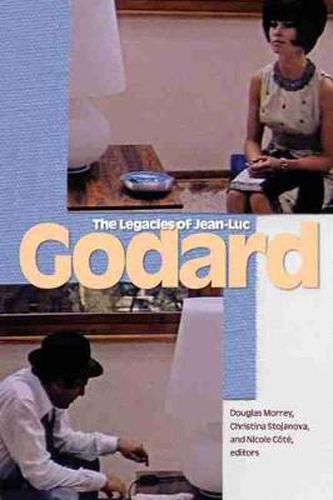Readings Newsletter
Become a Readings Member to make your shopping experience even easier.
Sign in or sign up for free!
You’re not far away from qualifying for FREE standard shipping within Australia
You’ve qualified for FREE standard shipping within Australia
The cart is loading…






This title is printed to order. This book may have been self-published. If so, we cannot guarantee the quality of the content. In the main most books will have gone through the editing process however some may not. We therefore suggest that you be aware of this before ordering this book. If in doubt check either the author or publisher’s details as we are unable to accept any returns unless they are faulty. Please contact us if you have any questions.
The artistic impact of Jean-Luc Godard, whose career in cinema has spanned over fifty years and yielded a hundred or more discrete works in different media cannot be overestimated, not only on French and other world cinemas, but on fields as diverse as television, video art, gallery installation, philosophy, music, literature, and dance.
The Legacies of Jean-Luc Godard marks an initial attempt to map the range and diversity of Godard’s impact across these different fields. It contains reassessments of key films like Vivre sa vie and Passion as well as considerations of Godard’s influence over directors like Christophe Honore. Contributors look at Godard’s relation to philosophy and influence over film philosophy through reference to Wittgenstein, Deleuze, and Cavell, and show how Godard’s work in cinema interacts with other arts, such as painting, music, and dance. They suggest that Godard’s late work makes important contributions to debates in memory and Holocaust Studies.
The volume will appeal to a non-specialist audience with its discussions of canonical films and treatment of themes popular within film studies programs such as cinema and ethics. But it will also attract academic specialists on Godard with its chapters on recent works, including Dans le noir du temps (2002) and Voyage(s) en utopie (2006), interventions in long-running academic debates (Godard, the Holocaust, and anti- Semitism), and treatment of rarely discussed areas of Godard’s work (choreographed movement).
$9.00 standard shipping within Australia
FREE standard shipping within Australia for orders over $100.00
Express & International shipping calculated at checkout
This title is printed to order. This book may have been self-published. If so, we cannot guarantee the quality of the content. In the main most books will have gone through the editing process however some may not. We therefore suggest that you be aware of this before ordering this book. If in doubt check either the author or publisher’s details as we are unable to accept any returns unless they are faulty. Please contact us if you have any questions.
The artistic impact of Jean-Luc Godard, whose career in cinema has spanned over fifty years and yielded a hundred or more discrete works in different media cannot be overestimated, not only on French and other world cinemas, but on fields as diverse as television, video art, gallery installation, philosophy, music, literature, and dance.
The Legacies of Jean-Luc Godard marks an initial attempt to map the range and diversity of Godard’s impact across these different fields. It contains reassessments of key films like Vivre sa vie and Passion as well as considerations of Godard’s influence over directors like Christophe Honore. Contributors look at Godard’s relation to philosophy and influence over film philosophy through reference to Wittgenstein, Deleuze, and Cavell, and show how Godard’s work in cinema interacts with other arts, such as painting, music, and dance. They suggest that Godard’s late work makes important contributions to debates in memory and Holocaust Studies.
The volume will appeal to a non-specialist audience with its discussions of canonical films and treatment of themes popular within film studies programs such as cinema and ethics. But it will also attract academic specialists on Godard with its chapters on recent works, including Dans le noir du temps (2002) and Voyage(s) en utopie (2006), interventions in long-running academic debates (Godard, the Holocaust, and anti- Semitism), and treatment of rarely discussed areas of Godard’s work (choreographed movement).